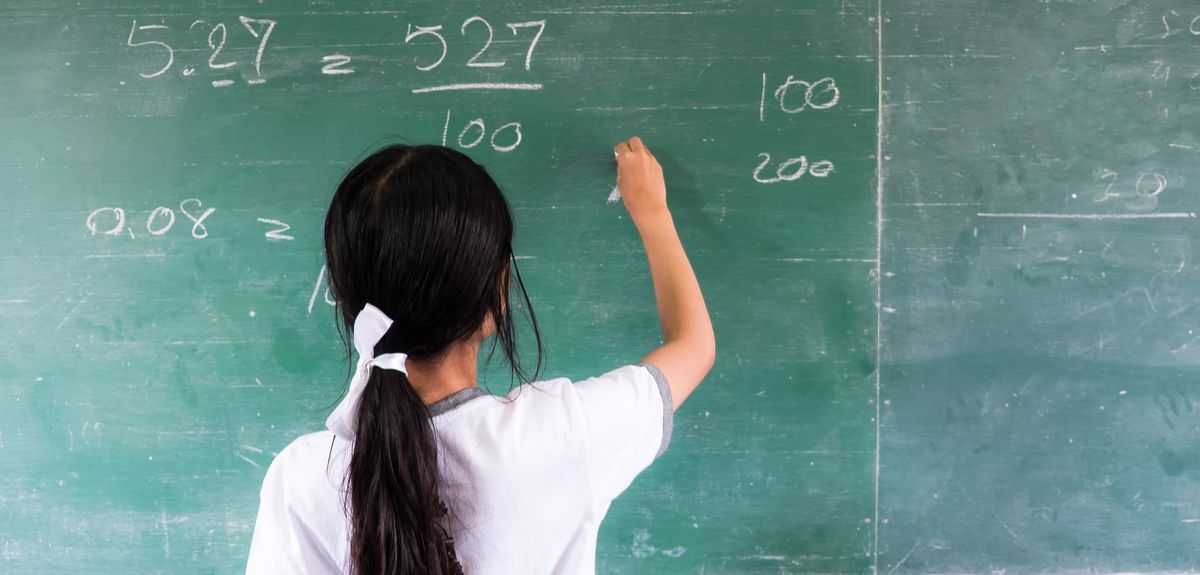
Image credit: Shutterstock
Brain stimulation may help children with learning difficulties
Applying a brain stimulation method, which was previously suggested to enhance mathematical learning in healthy adults, may improve the performance of children with mathematical learning difficulties, according to an exploratory study by researchers from the universities of Oxford and Cambridge.
The early stage, small-scale study, which has been published in Nature’s open access journal Scientific Reports, involved twelve children between the ages of eight and eleven with learning difficulties in mathematics.
The study took place at Fairley House, a specialist day school for children with specific learning difficulties in London. After careful safety screening, the children were split into two groups of six. One group wore a cap attached to a light, battery-operated device through which painless low electrical current was applied over the left and right areas on the forehead, above regions of the brain called the dorsolateral prefrontal cortices. This region has been highlighted to play a role in mathematical learning.
The method of stimulation, which is known as transcranial random noise stimulation (tRNS), was applied in nine 20-minute sessions over five weeks.
The other group wore an identical cap but did not receive any stimulation. Children did not detect reliably whether they received stimulation or not.
While wearing the caps, the children in both groups played a specially-designed numerical training game developed by the researchers, which integrates numerical learning and visuospatial components, with bodily movements, while the game changed its level adaptively based on the child’s performance.
Immediately before and after the trial, the researchers also measured their performance in a mathematical test called MALT, a standardized diagnostic tool calibrated to the UK’s national curriculum.
They found that stimulation yields a mixed effect in term of performance but improved the learning of children during the numerical training game, compared to those who wore the ‘placebo’ cap.
The results also hinted that the positive effects of tRNS have contributed to improved results on the MALT test.
These findings resemble previous studies on healthy adults that suggested tRNS over the same regions of the brain improved arithmetic learning compared to the control group, and generalised to related materials that were not specifically trained.
Professor Roi Cohen Kadosh of Oxford University’s Department of Experimental Psychology, said: ‘Compared to children without learning difficulties, children with learning difficulties have a brain that works differently. This is usually associated with poor learning, and in turn might impair typical brain development.
‘Learning difficulties are usually treated by behavioural interventions, but these have shown little efficacy, especially in brains with neural atypicalities. Our research suggests that children with learning difficulties might benefit from combining their learning with tRNS, which has been suggested to improve learning and alter brain functions in healthy adults.’
But the authors warn that this study is just the first step from a scientific perspective. To understand the potential of tRNS for improving learning and cognition of children with learning difficulties, we need to run more studies, and see whether these results replicate. We also need to understand the neural mechanisms that support such improvements in learning.
‘Maths is something that many people find challenging, and worries a lot of people so the potential for neuroscience to help those with difficulties to learn better is exciting but there are still a lot of ethical and scientific issues to explore,’ says Professor Cohen Kadosh who also worked with Oxford neuroethicists to deal with such problems.
‘It is also important to explore its impact on children from different educational and cultural backgrounds, and children with other developmental conditions, such as dyslexia or ADHD. This would allow a better understanding if such approach could be used in schools to help those with learning difficulties in the future.’
This type of study was first to take place in a school environment. Professor Cohen Kadosh said he hopes this trial will encourage other schools to take part in future neuroscientific research, but warned that members of the public should not try to use tRNS on themselves or on children.
‘The trial was carried out by experts with years of training in brain stimulation and expertise in mathematical cognition, who did careful medical and safety screening before deciding if a child could take part in the study,’ he said.
‘We urge people not to buy devices claimed to achieve these or similar results - do not try this at home!’
The full paper, 'Transcranial random noise stimulation and cognitive training to improve learning and cognition of the atypically developing brain: A pilot study,' can be read in the journal Nature - Scientific Reports.
 Expert Comment: Is an under-16 social media ban the right course?
Expert Comment: Is an under-16 social media ban the right course?
 ADHD medication use rises sharply across Europe, driven by growth among adults
ADHD medication use rises sharply across Europe, driven by growth among adults